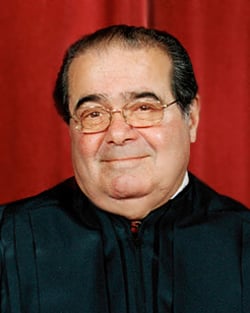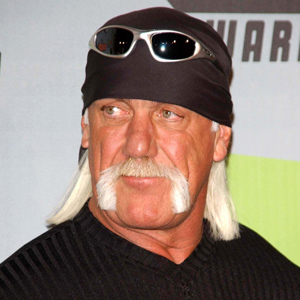The top legal stories of 2016

Updated: As the ABA Journal staff looked back over the past year, these were the 10 legal stories that seemed the most important and prominent. A summary of each is below.
1. Trump wins. If someone had told you one year ago that the 45th president of the United States would be a real estate tycoon and reality television host who broke decades of precedent by refusing to release his tax returns, got into Twitter wars with C-list celebrities, was caught on a hot mic saying that he likes to grope women, was widely disliked within his own party’s power structure and became the poster child for white nationalists, would you have believed it?
And yet here we are. Donald Trump defeated Hillary Clinton in the 2016 presidential election, winning a clear majority in the Electoral College despite losing in the popular vote.
Trump’s shocking victory promises to drastically alter the legal landscape in the coming years. Trump has promised to gut Dodd-Frank, repeal and replace the Affordable Care Act, renegotiate free trade deals and possibly deport millions of immigrants living here illegally—among other things.

Justice Antonin Scalia.
2. Supreme Court shuffle. President Trump will also have a U.S. Supreme Court seat to fill. In February, Justice Antonin Scalia died while on a hunting trip in Texas. During his 30-year tenure, he helped popularize the use of original intent in interpreting the Constitution while his outspoken nature on and off the bench earned him plenty of admirers and detractors.
President Barack Obama nominated D.C. Circuit Judge Merrick Garland to fill the vacancy, but Senate Majority Leader Mitch McConnell and Judiciary Committee Chairman Chuck Grassley immediately vowed not to give Garland a hearing, let alone a vote before the entire Senate.
Despite some outside pressure, the Republicans held firm and their gamble paid off when Trump won the Presidential race. The President-elect has promised to appoint a justice in the “Antonin Scalia mold.”
3. Russia hacks affect the U.S. election. Could Julian Assange and Vladimir Putin have swung the Presidential election to Trump?
U.S. intelligence officials seem to think so. The Washington Post and New York Times reported in early December that the CIA has concluded with “high confidence” that Russia tried to help Trump win and that Russians hacked the emails of various Democrats and leaked them to Wikileaks. Russian officials have denied the accusation. While the CIA has concluded that Republicans were also hacked, their emails have on the whole remained private.
For his part, Donald Trump’s transition team immediately dismissed the report. “These are the same people that said Saddam Hussein had weapons of mass destruction,” the team said in a Friday, Dec. 9, statement.
On Dec. 29, in response to the election hacking, President Barack Obama ordered sanctions on two top Russian intelligence services and officials within those services and gave 35 Russian diplomats 72 hours to leave the country, the Associated Press reported. The U.S. is also closing down two recreational facilities owned by the Russian government—one in Maryland and one in New York.
On Dec.28, in response to reports about today’s announcement, Trump told the <a http://www.nytimes.com/2016/12/29/us/politics/donald-trump-russia-hack.html”>New York Times: “I think we ought to get on with our lives. I think that computers have complicated lives very greatly. The whole age of computer has made it where nobody knows exactly what is going on. We have speed, we have a lot of other things, but I’m not sure we have the kind, the security we need.”
4. The Panama Papers go public. Every law firm’s worst nightmare (besides going out of business) happened to Panamanian firm Mossack Fonseca. In April, more than 11.5 million internal documents and files were leaked to the German newspaper Süddeutsche Zeitung. The documents included confidential client files and information about how the firm had allegedly created and utilized shell corporations to help wealthy individuals and entities hide their assets. Some of the named individuals included then-UK Prime Minister David Cameron and Icelandic Prime Minister Sigmundur Davíð Gunnlaugsson, as well as several known associates of Vladimir Putin.
The firm, founded by German lawyer Jürgen Mossack in 1977 before he was joined by Panamanian novelist/lawyer Ramón Fonseca in 1986, issued a statement denying any wrongdoing. “The facts are these,” the firm said in an April statement, “while we may have been the victim of a data breach, nothing we’ve seen in this illegally obtained cache of documents suggests we’ve done anything illegal, and that’s very much in keeping with the global reputation we’ve built over the past 40 years of doing business the right way.”
However, since the leak, the firm has been under investigation by multiple agencies and countries, including the U.S. Department of Justice. In April, the firm’s headquarters were raided by Panamanian police, while Salvadoran authorities raided the firm’s San Salvador office.
5. A near-record for mergers & acquisitions. The year 2015 was a record one for mergers and acquisitions. And according to the Intralinks Deal Flow Predictor, fiscal year 2016 is actually projected to surpass it.
Leading the way, in terms of value of the deal, is the $86 billion merger between Time Warner Cable and AT&T. Trump has said on the campaign stump that he would veto the deal, however his transition team has assured AT&T that it will review the deal with an open mind, Fortune reported. Other major deals this year include a $47 billion agreement between Qualcomm and NXP Semiconductors, a $32 billion pact between Shire and Baxalta, and a $26.2 billion accord between Microsoft and LinkedIn.
It was also a busy year for law firm mergers. In December, Eversheds and Atlanta’s Sutherland Asbill & Brennan announced a merger that would form a 2,300 lawyer firm across 61 offices in 29 countries worldwide, The previous month, famed firms Arnold & Porter and Kaye Scholer agreed to join forces, forming Arnold & Porter Kaye Scholer. Other major announced deals include Littler Mendelson combining with French labor & employment firm Fromont Briens, Baker Donelson merging with Ober Kaler, and Kirkland & Ellis acquiring Paul Clement’s firm, Bancroft. The American Lawyer reported on a number of rumored deals that, if successful, could take 2016 to within striking distance of last year’s record for law firm mergers.
But while reports said a number of firms were sniffing around struggling international law firm King & Wood Mallesons, as the year’s end approached, other firms were pulling out choice partners and practices from the UK, Europe and Middle East portion of the verein firm.

6. The Brexit vote. The United Kingdom’s complicated history with the European Union took an unpredictable turn in June. UK voters narrowly approved a referendum to leave the EU, ending over 40 years of membership in the multinational union (the UK joined the EU’s predecessor entity, the European Economic Community, in 1973).
The vote exposed deep divisions between the UK constituent countries. Scotland and Northern Ireland voted to remain while England (with the glaring exception of London) and Wales voted to leave. Scotland governmental officials have begun the process for preparing for a second referendum for independence from the UK so that it may remain in the EU. As for Northern Ireland, the Brexit raised fears that the near 20-year cease-fire that came about after the 1997 Good Friday Accords could be in jeopardy.
The vote also brought an end to the premiership of David Cameron, who had favored remaining in the EU. His successor, Theresa May, has promised to trigger Article 50 of the Treaty on European Union, which allows members to withdraw. But the British High Court of Justice ruled in December that Parliament must first vote to invoke it.
7. Police shootings and civil unrest. It was another big year—very unfortunately—for police shootings. As of Dec. 29, the number of individuals shot and killed by police officers throughout the country stood at 955—a tick below 2015’s mark of 991, according to the Washington Post.
In two major cities, police shootings of African-Americans led to rioting and unrest. In August, protesters took to the streets in Milwaukee for several days after police shot Sylville Smith to death. The following month, Charlotte police killed Keith Scott, sparking several days of unrest and street protests. In late November, authorities decided not to press charges against the police officers who killed Scott, finding that they had acted lawfully.
Police also found themselves in the line of fire. In Dallas, a man ambushed and killed five police officers and wounded nine other officers that were providing security for a July demonstration against police brutality. Four months later, two police officers were killed in separate attacks in Des Moines. According to CBS News, there was a 67 percent increase in fatal shootings of police officers in 2016 as of late November with 60 fatalities, including 20 in ambushes.
Meanwhile, the increased use of body cams by police officers has led to concerns from civil liberties and electronic privacy-rights groups about possible abuses of the technology. This area could well be ripe field for lawyers in the coming years. In February, a federal judge in Philadelphia ruled that there is First Amendment right to take cellphone videos of police unless the purpose is to challenge or criticize police conduct. The plaintiffs in that case have already appealed to the 3rd U.S. Circuit Court of Appeals.

Image of Hulk Hogan by s_bukley / Shutterstock.com.
8. Hulk Hogan bodyslams Gawker. He has defeated the likes of Andre the Giant, The Iron Sheik, Randy “Macho Man” Savage, and Sgt. Slaughter. Add Gawker to the list of those vanquished by the Hulkster.
Hogan (real name: Terry Bollea) sued Gawker for violating his privacy rights and intentionally inflicting emotional distress after the gossip blog published portions of a sex tape featuring the ex-WWE champ with his friend’s wife. In March, Hogan won a $140 million verdict—a figure that forced Gawker to declare bankruptcy. Univision stepped in and bought Gawker and six of its affiliated websites while Gawker reached a settlement with Hogan for $31 million.
Later it was revealed that billionaire Peter Thiel had helped finance Hogan’s legal challenge. “If you’re a single-digit millionaire like Hulk Hogan, you have no effective access to our legal system,” Thiel said at a press conference after the verdict.
9. Transgender bathroom law in North Carolina. When Charlotte passed a nondiscrimination ordinance forbidding discrimination based on sexual orientation or gender identity in February, the Republican-dominated North Carolina legislature hastily passed a bill that effectively overruled the Charlotte ordinance. House Bill 2 took only 11 hours to become law as Republican Gov.Pat McCrory, a former mayor of Charlotte, signed it the same evening it was passed by the North Carolina Senate.
HB2 prohibited cities and counties from expanding on existing LGBTQ protections and explicitly excluded sexual orientation from the classes of people entitled to protection from discrimination, according to the Charlotte Observer. The most prominent part of HB2 dealt with public restrooms: The law specifically targeted transgender individuals, mandating that, unless they had taken surgical steps to change the gender listed on their birth certificate, they had to use the public restroom that corresponded to the one listed on the birth certificate.
The law prompted a furious backlash from companies and sports and entertainment associations. According to Business Insider, the state lost $400 million as a result of HB2—most notably, PayPal and Deutsche Bank cancelled plans for expansion in the state while the NBA and NCAA pulled high-profile events, including the 2017 NBA All Star Game. McCrory ultimately paid a price for his support— in a great year otherwise for Republicans in his state, McCrory narrowly lost the governorship to North Carolina Attorney General Roy Cooper, a Democrat and outspoken opponent of HB2.
The GOP-controlled legislature then gave lame-duck McCrory two bills, which he signed, curtailing many of Cooper’s powers going forward. According to the Raleigh News & Observer, Cooper’s cabinet choices now must be approved by the state senate, and the number of political appointments he can make will be slashed by more than a third (from 1,500 to 425).
10. China cracks down on lawyers NGOs. In August, Chinese lawyer Zhou Shifeng was sentenced to seven years in prison for defending prominent Chinese dissidents, including Ai Weiwei and the Falun Gong movement. According to The Atlantic, Zhou and approximately 300 other activists and attorneys were arrested last year. At the time Zhou pleaded guilty to subversion, approximately 20 of those detainees were still in custody, including additional lawyers at Zhou’s firm.
“This feels like the biggest attack we’ve ever experienced,” Zhang Lei, a lawyer in southern China, told the New York Times in 2015. Zhang was questioned and released by the police. “It looks like they’re acting by the law, but hardly any of the lawyers who disappeared have been allowed to see their own lawyers. Over 200 brought in for questioning and warnings—I’ve never seen anything like it before.”
Meanwhile, in April, China approved a law that would give police broad powers to investigate and surveil the more than 7,000 foreign nongovernmental organizations in the country. According to another New York Times article, the move comes amid Chinese President Xi Jinping’s drive to limit Western influence in the country.
Honorable mention: James Comey became a central figure in the presidential election and drew criticism from both parties for the FBI investigation into Hillary Clinton’s use of a private email server while Secretary of State. In July, Comey incurred the wrath of Republicans after he recommended that no criminal charges be brought against Clinton. Then Comey revealed, two weeks before the election, that he had reopened the investigation because of new emails that had come to light. But on Nov. 6, two days before the election, Comey wrote a second letter to Congress saying the new emails did not change his opinion from July. Many Clinton allies, including Bill Clinton, blamed Comey for costing Hillary Clinton the election.
What are your choices for 2016’s top legal stories? Please put your opinions in the comments.
Last updated Dec. 29 to note President Obama’s sanctions against Russia.



